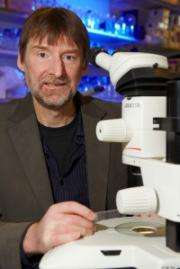Gene discovery shows parents divided over brain and brawn

(PhysOrg.com) -- Scientists at the University of Bath have discovered a gene that defies conventional rules, with the copies inherited from mum and dad doing two very different jobs.
All animals have two copies of each gene: one inherited from each parent. For most genes, both copies are active, but for some genes, one copy is switched off – a process called imprinting.
The researchers at Bath, working with scientists at the Neuroscience & Mental Health Research Institute in Cardiff University, have found that a gene called Grb10 has both copies active but the copy from the father is only active in the brain, whilst the maternal copy is active in all other parts of the body. It seems that each parent has unwittingly prioritised a different part of the body through the power of genetics – a key question is what is the consequence of this?
The study, published in the prestigious journal Nature, has shown that the two copies actually drive very different processes: the maternal copy is involved in foetal growth, metabolism and fat storage, whereas the paternal one regulates social behaviour in adults.
To confirm this, the researchers studied the behaviour of mice that lacked a copy of Grb10 from their father i.e. the gene was not active in the brain and worked normally in the rest of the body. They found that these mice were more domineering, over-grooming their companions and being more assertive than those with the active gene.
The work, funded from several sources, including the Biotechnology and Biological Sciences Research Council (BBSRC), Medical Research Council and a Wellcome Trust “Value in People” award, gives scientists a better understanding of how imprinted genes work, shedding light on processes that are important for our health and well-being.
Dr Andrew Ward, from the University of Bath’s Centre for Regenerative Medicine, said: “For the first time, we’ve shown that the same gene can have two very different functions depending on which parent each copy is inherited from. It seems that the mother and father are using different strategies to help their offspring, one focussed on the body and the other on the mind.
“Imprinted genes are proving to be important for many aspects of human health. Here is a single gene that may link growth in the womb with both physical and mental health in later life.
“It’s amazing that one gene can affect both brain and brawn in this way. In future research we’d like to investigate how this single gene might have evolved to serve such distinct purposes.”
Dr Alastair Garfield, who carried out the work at Bath and Cardiff but is now working at the University of Cambridge, said: “Grb10 is the first example of an imprinted gene that regulates social behaviour in adults.
“Asserting your dominance over others in your social group can be risky behaviour, and this gene appears to keep that behaviour in check.
“Our study has been in mice, but many genes that are imprinted in mice are also similarly imprinted in humans, so we predict Grb10 could work in a similar way in people.”





















